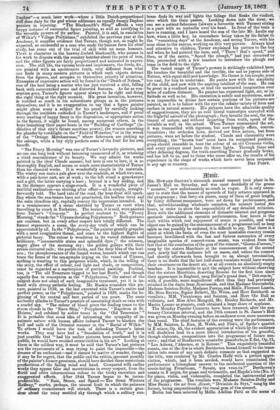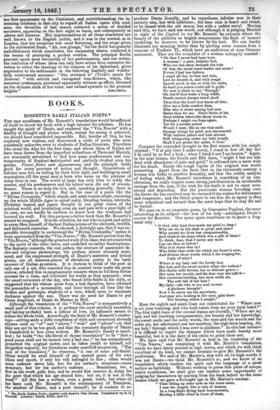311trit.
MR. Howean GLOVER'S sixteenth annual concert took place in St. James's Hall on Saturday, and was most decidedly of the genus "monster," now unfortunately so much in vogue. It is only neces- sary to state that the names of upwards of forty artistes appeared in the programme ; that forty-six pieces, many of them of great length, by thirty different composers, were set down for performance, and that, notwithstanding wholesale omission, the concert lasted five hours, in order to show the impossibility of any detailed criticism. Even with the additional elements of dramatic interest and gorgeous spectacle introduced in. operatic performances, four hours is the limit within which real enjoyment of music is possible, and what object can be gained by the announcement of a programme half as long again as can possibly be endured, it is difficult to say. That there is a point at which the brain of even the most insatiable country cousin becomes bewildered with the fast and furious succession of every imaginable species of concert-room music, was evident from the fact that at the conclusion of the gem of the concert,"Giorno d'orrore," sung by the sisters Marchisio at the commencement of the second part, nearly half the audience left en mime, and unless the concert had shortly afterwards been brought to an abrupt termination, there is no doubt that the last half-dozen vocalists would have wasted their sweetness on the desert air, or at all events on absolutely empty benches. It is impossible to quit the subject here without observing that the sisters Marchisio, deserting Rossini for the first time since their appearance in England, sang Bellini's grand duet, "Deli con te," with, if possible, more magnificent effect than they had previously attained in the duets from Se miramirle, and that Madame Gaerrabella, Madame Sainton-Dolby, Madame Parepa, and Mdlle. Florence Lancia, Mr. Sims Reeves, Signor Belletti, Mr. Weiss, and Herr Reichardt as vocalists; MM. Vieuxtemps and Sainton, and Herr Ole Bull as violinists, and Miss Alice Mangold, Mr. Brinley Richards, and Mr. Martin Lazare as pianists, each obtained a large share of applause.
The Monday Popular Concerts have been resumed, after the cus- tomary Christmas interval, and- the 70th concert in St. James's Hall was given on Monday evening before an audience even more numerous than. usual. The chief features of the evening were the performance,
by Sainton, L. Ries, H. Webb, and Piatti, of Spohr's quartet in E minor, Op. 45, the evident appreciation of which by the audience will doubtless lead to a more liberal introduction of his graceful, though elaborate, compositions into the programme of future con- certs; and that of Beethoven's sonata for manoforte,in E flat, Op. 81, "Les Adieux, PAbsence, et le Retour." This exquisitely beautiful sonata, one of the few in which Beethoven bound himself to the trans- lation into music of any such definite romance as that suggested in the title, was rendered by Mr. Charles Halts with a perfect appre- ciation, which, had it been needed, would have constituted, the performance a triumphant answer to the celebrated qu.estion of the music-hating Frenchman, " Senate, que veux-tu?' Beethoven's sonata in F major, for piano and violoncello, and Haydn's trio (No. 5) for piano, violin, amid, violoncello, completed the instrumental part of the programme. The vocalists were Madame Sainton-Dolby and Miss Banks ; the air from ..41ceste, " Divinites du Styx," sung by the former, being unquestionably the.vocal gem of the' concert.
Berlin has been selected by Mlle. Adelina Patti as the scene of her first appearance on the Continent, and notwithstanding the in- creasing tendency in that city to regard all Italian opera with cool- ness, our favourite of last season achieved a series of decided successes, appearing on the first night as Lucia, and subsequently as Amina and Leonora. Her impersonations of all these characters are well known to the English public, and it was in the second, as in London, that her reception was most flattering, and the scope given in the celebrated finale, " Ah, non giunge," for the florid but graceful embellishment which constitutes her surpassing charm, rendered. it the means of procuring a perfect ovation. The principal Berlin journals speak most favourably of her performances, and. one writer, the confusion of whose ideas can only have arisen from excessive de- votion to either the theology or the tobacco of his fatherland, gives expression to his enthusiasm in the following fearfully and wonder- fully constructed sentence : "She crowned it" (Verdi's music for Leonora) "with artistic and variegated tone-flowers, which, like sonorous arabesques, produced apparently without an effort, bloomed on the delicate stalk of her voice, and twined upwards to the greatest































 Previous page
Previous page